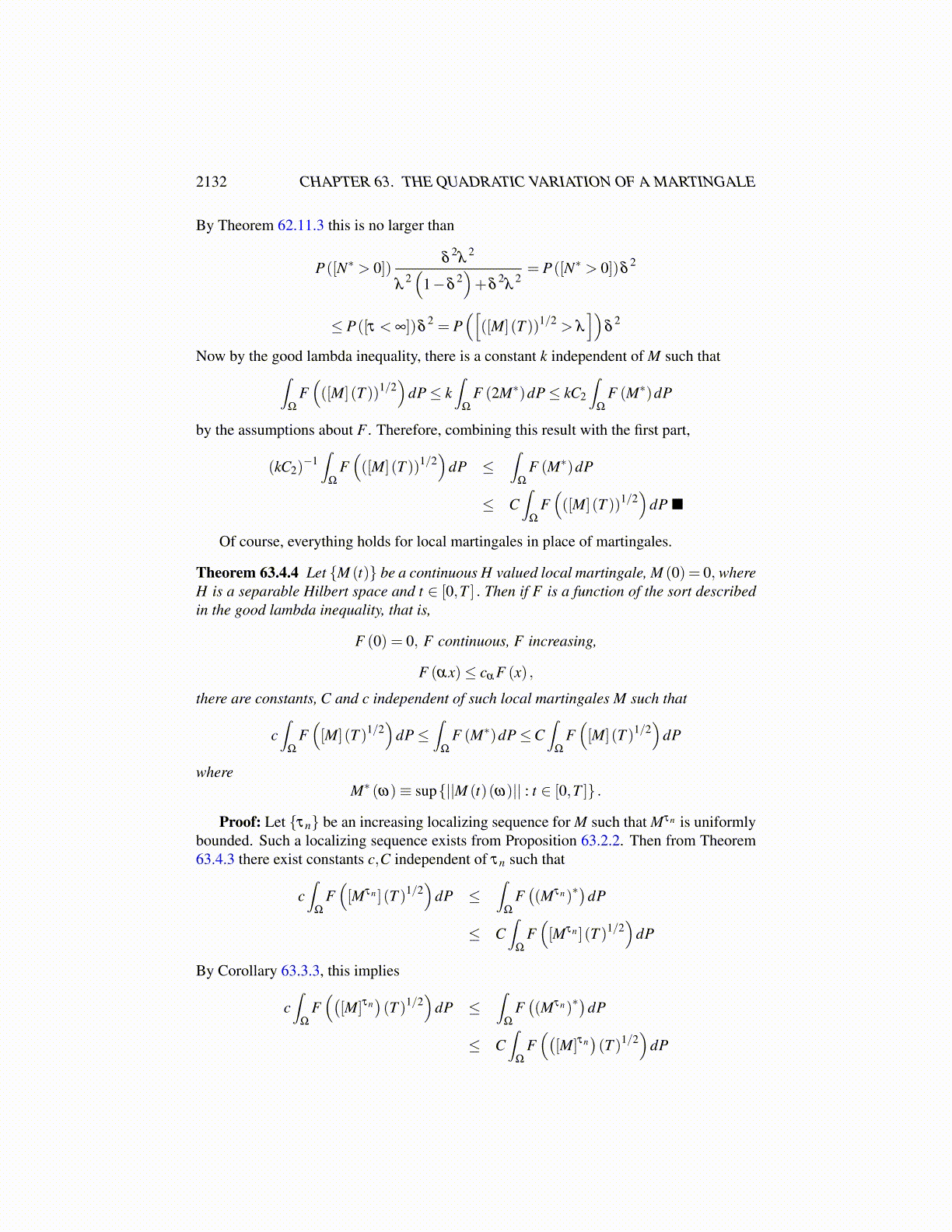
2132 CHAPTER 63. THE QUADRATIC VARIATION OF A MARTINGALE
whereτ ≡ inf{t ∈ [0,T ] : ||M (t)||> λ}
Thus N is a martingale and N (0)= 0. In fact N (t)= 0 as long as t ≤ τ . As usual inf( /0)≡∞.Note
[τ < ∞] = [M∗ > λ ]⊇ [N∗ > 0] .
This is because to say τ < ∞ is to say there exists t < T such that ||M (t)||> λ which is thesame as saying M∗ > λ . Thus the first two sets are equal. If τ = ∞, then from the formulafor N (t) above, N (t) = 0 for all t ∈ [0,T ] and so it can’t happen that N∗ > 0. Thus the thirdset is contained in [τ < ∞] as claimed.
Let β > 2 and let δ ∈ (0,1) . Then
β −1 > 1 > δ > 0
Consider the following which is set up to use the good lambda inequality.
Sr ≡ [M∗ > βλ ]∩[([M] (T ))1/2 ≤ rδλ
]where 0 < r < 1.It is shown that Sr corresponds to hitting “this before that” and there is anestimate for this which involves P([N∗ > 0]) which is bounded above by P([M∗ > λ ]) asdiscussed above. This will satisfy the hypotheses of the good lambda inequality.
Claim: For ω ∈ Sr, N (t) hits λ2(
1−δ2).
Proof of claim: For ω ∈ Sr, there exists a t < T such that ||M (t)||> βλ and so usingCorollary 63.3.3,
N (t) ≥ |||M (t)||− ||Mτ (t)|||2− [M−Mτ ] (t)≥ |βλ −λ |2− [M] (t)
≥ (β −1)2λ
2−δ2λ
2
which shows that N (t) hits (β −1)2λ
2 − δ2λ
2 for ω ∈ Sr. By the intermediate valuetheorem, it also hits λ
2(
1−δ2)
. This proves the claim.
Claim: N (t)(ω) never hits −δ2λ
2 for ω ∈ Sr.
Proof of claim: Suppose t is the first time N (t) reaches −δ2λ
2. Then t > τ and so
N (t) = −δ2λ
2 ≥ |||M (t)||−λ |2− [M] (t)+ [Mτ ] (t)
≥ −r2λ
2δ
2,
a contradiction since r < 1. This proves the claim.Therefore, for all ω ∈ Sr, N (t)(ω) reaches λ
2(
1−δ2)
before it reaches −δ2λ
2. Itfollows
P(Sr)≤ P(
N (t) reaches λ2(
1−δ2)
before −δ2λ
2)
and because of Theorem 62.11.3 this is no larger than
P([N∗ > 0])δ
2λ
2
λ2(
1−δ2)−(−δ
2λ
2) = P([N∗ > 0])δ
2 ≤ δ2P([M∗ > λ ]) .